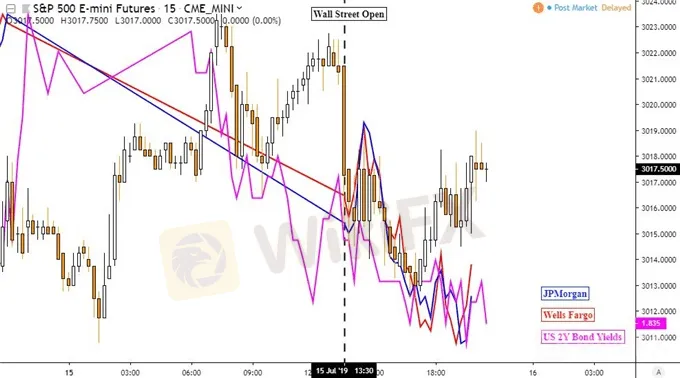简体中文
繁體中文
English
Pусский
日本語
ภาษาไทย
Tiếng Việt
Bahasa Indonesia
Español
हिन्दी
Filippiiniläinen
Français
Deutsch
Português
Türkçe
한국어
العربية
CAD Sunk With Crude Oil, Citigroup Earnings Underpin Growth Frets
Abstract:The Canadian Dollar fell with crude oil prices as Citigroup earnings foreshadowed a disappointing season for banks, underpinning global growth concerns. NZD eyes New Zealand CPI data.
Asia Pacific Market Open Talking Points
Canadian Dollar sinks with crude oil as BoC rate cut bets rise
Citigroup earnings foreshadow disappointing season for banks
NZD/USD eyeing volatility on deviation in New Zealand CPI
Not sure where crude oil prices are heading next? We recently released the third quarter Crude Oil fundamental and technical forecast!
Canadian Dollar Sinks with Crude Oil Prices on US Bank Earnings Concerns
The Canadian Dollar underperformed against its major counterparts as odds of a BoC rate cut by year-end climbed to about 45% on Monday from 33% at the end of last week. Indeed, Canadian front-end government bond yields traded to the downside over these past 24 hours. The cause of these bets seemed to stem from external factors as crude oil prices suffered their worst day in almost two weeks.
Turning our attention towards the US, the S&P 500, while gapping to the upside, spent the rest of its day trading lower as it finished little changed from Fridays close. Examining the sectors, the index was led lower by financials. More specifically, banks declined over one percent despite Citigroup reporting an EPS beat of $1.83 versus 1.80 expected as second quarter revenue climbed 2% y/y.
However, trading revenue dropped roughly 5% as CFO Mark Mason fretted about trade wars and the Fed stance weighing on client sentiment. At one point, Citigroup shares were down about 2.32% after market open. While the stock pared losses, those of JPMorgan and Wells Fargo, ahead of their earnings report on Tuesday, sunk and stayed lower. This might reflect the markets anticipating similar frets from them ahead.
Moreover, on the chart below, US bond yields declined as markets remain concerned over the outlook from the Federal Reserve and global growth. This works to dampen demand prospects for sentiment-linked crude oil prices. Meanwhile, the commodity is a key revenue for Canada and thus can impact domestic monetary policy. All eyes for the Loonie are on this weeks Canadian CPI report.
Chart of the Day – Sentiment Dragged Down by Bank Shares

Chart Created in TradingView
Tuesdays Asia Pacific Trading Session
S&P 500 futures are little changed ahead of Tuesdays Asia Pacific trading session. This places the focus on key fundamental event risk for currencies ahead. Most notably are the New Zealand CPI report and latest minutes from the RBA rate decision earlier this month. For the former, the RBNZs data-dependent approach leaves NZD/USD vulnerable to volatility given a surprise deviation from expectations.
FX Trading Resources
See how the S&P 500 is viewed by the trading community at the DailyFX Sentiment Page
See our free guide to learn what are the long-term forces driving Crude Oil prices
See our study on the history of trade wars to learn how it might influence financial markets!
Disclaimer:
The views in this article only represent the author's personal views, and do not constitute investment advice on this platform. This platform does not guarantee the accuracy, completeness and timeliness of the information in the article, and will not be liable for any loss caused by the use of or reliance on the information in the article.
Read more

Crude Oil Futures: Extra gains likely in the short-term
Crude Oil Futures: Extra gains likely in the short-term

Crude Oil May Rebound As Inventory Surges
This Tuesday (June 9th), Saudi announced it will stop cutting oil production beyond OPEC+ agreement, which sent WTI from above US$39 down to US$ 37.07. However, with the surge of crude inventory, oil prices are expected to rebound further.

Crude Oil Demand May See Largest Quarterly Decline in History
Due to the rapid-evolving public health emergency around the globe, the daily demand for crude oil will decrease by 3.8 million barrels year-on-year. Prior to this, Goldman Sachs had been the first among Wall Street's major investment banks to predict a sharp decline in crude oil consumption this quarter. The unprecedented drop of demand came as a sudden shock.
China could be the biggest loser from the Saudi Arabia oil attack
An expert told Business Insider that China has been the largest buyer of Saudi oil since 2009 and could be most impacted by a halt to oil exports.
WikiFX Broker
Latest News
Volkswagen agrees deal to avoid Germany plant closures
Geopolitical Events: What They Are & Their Impact?
Top 10 Trading Indicators Every Forex Trader Should Know
WikiEXPO Global Expert Interview: Simone Martin—— Exploring Financial Regulation Change
TradingView Launches Liquidity Analysis Tool DEX Screener
MultiBank Group Wins Big at Traders Fair Hong Kong 2024
'Young investors make investment decisions impulsively to keep up with current trends' FCA Reveals
Why Do You Feel Scared During Trade Execution?
CySEC Settles Compliance Case with Fxview Operator Charlgate Ltd
Scope Markets Review: Trustworthy or Risky?
Currency Calculator


